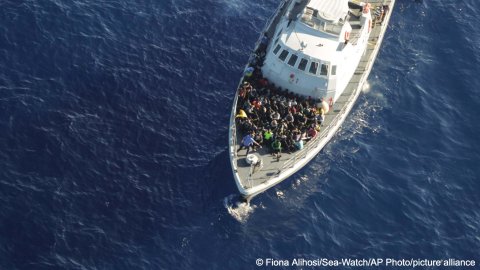Libya’s Migrant Crisis: A Growing Concern in 2023
Libya has become a focal point for migration issues in recent years, with the Mediterranean Sea serving as a perilous route for thousands of migrants attempting to reach Europe. In 2023 alone, nearly 15,000 migrants have been intercepted and returned to Libya, highlighting an escalating humanitarian crisis that requires urgent attention.
The Current Situation
The journey for migrants heading towards Europe is fraught with danger. Many come from war-torn countries or those facing dire economic conditions. As they attempt to cross the Mediterranean, they are often intercepted by the Libyan Coast Guard, which operates under agreements with the European Union to curb irregular migration. The Libyan authorities have reported a significant increase in interceptions this year, indicating that the crisis is deepening.
–
–
–
Humanitarian Concerns
Many of those returned to Libya face dire conditions in detention centers. Reports from various humanitarian organizations suggest that migrants are subjected to overcrowding, inadequate medical care, and lack of basic necessities. The situation raises questions about the international community’s responsibility to protect vulnerable populations and provide safe migration pathways.
The United Nations and other humanitarian groups have criticized the treatment of migrants in Libya, urging for reforms and better oversight of detention facilities. Additionally, the ongoing conflict within Libya complicates efforts to provide humanitarian aid and support to those in need.
International Response and Policies
In light of these challenges, various countries and organizations are reassessing their migration policies. The European Union has been under scrutiny for its agreements with Libya, which prioritize border control over humanitarian considerations. Advocates for migrants argue that such policies are not sustainable and may contribute to further human rights violations.
Additionally, the recent discussions surrounding immigration reform news in the U.S. have drawn parallels to the situation in Libya. As nations grapple with how to manage migration effectively, it becomes increasingly clear that comprehensive solutions are needed that prioritize the safety and dignity of migrants.
Future Prospects
As Libya continues to grapple with its internal challenges, the prospect for migrants remains uncertain. The potential for further interceptions looms large, and without significant international intervention, the humanitarian situation may worsen.
–
–
–
Conclusion
The crisis in Libya underscores the urgent need for a collaborative approach to migration issues. As nearly 15,000 migrants have been intercepted and returned this year, it is vital for the international community to respond with compassion and strategic action. Addressing the root causes of migration, ensuring humane treatment of individuals, and fostering international cooperation are essential steps toward resolving this ongoing crisis.
In the face of such challenges, it is imperative that we prioritize the voices and rights of migrants, ensuring that their journeys do not end in further suffering. As we move forward, we must remain vigilant and proactive in advocating for humane and just immigration policies that reflect our shared humanity.










